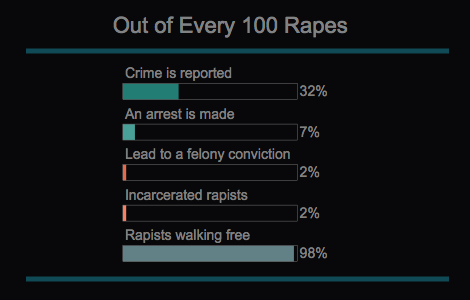Op-Ed: No more Statute of Limitations for sexual assault crimes
Bill Cosby will not face charges for two sexual assault investigations, the Los Angeles County Attorney announced on Jan. 6, 2016. The more recent of the two cases, which occurred in 2008, was dropped due to a lack of supporting evidence. The second case was not pursued because it took place outside of the statute of limitations.
In this case, a woman listed as Jane Doe No. 1 reported that Cosby allegedly raped her in 1965 when she was 17 years old. According to The National Center for Victims of Crime, the statute of limitations for sexual offenses against a minor in California is the time period before the victim turns 28 years old — meaning that in order to successfully take this case to court, Doe only had until 1976 to file against Cosby.
According to the website of the Judicial Branch of California, “A statute of limitations is the deadline for filing a lawsuit. Most lawsuits MUST be filed within a certain amount of time. In general, once the statute of limitations on a case ‘runs out,’ the legal claim is not valid any longer.”
When I first learned of the statute of limitations, I didn’t see the purpose of it. Why do crimes need to have an expiration date? To my disappointment, the reasoning behind the statute of limitations seems to heavily favor the defendants and their needs, as opposed to the victims’.
According to the Santa Clara University School of Law, the purpose of the statute of limitations for any crime is to protect the defendant. More specifically, it was created to “reduce uncertainty,” “prevent fraud” and “place the defendants and plaintiffs on an equal footing.”
The last part angered me. The statute of limitations gives the defendant an unfair advantage. An act of rape does not simply go away after a certain number of years. The fact that time has passed does not mean that the rape is somehow excused or pardoned. Someone was still raped and someone should still be held accountable.
Also, what about protecting the victim? Reporting a crime should not be a “you snooze, you lose” situation. In some sexual assault cases, the plaintiff or victim has no memory of the crime, because they were either too young to remember, intoxicated or experienced some other form of memory impairment. So, they might have only recently learned of the crime from a friend who witnessed it.
Another reason why many sexual assault crimes go so long without being reported is because the victim likely knows the statistics of reported sexual assault crimes and how many of those crimes actually make it to court. If they didn’t already know, their lawyer has likely told them.
According to the Rape, Abuse & Incest National Network (RAINN) website, 32 out of every 100 rape crimes are reported. Seven out of those 32 lead to an arrest. Two will lead to a felony conviction. And lastly, two out of every 100 rapists will ever spend a single day in jail. The other 98 will walk free and are allowed to re-enter society.

Many other factors play into why a victim hesitates to even tell anyone about their rape. The closer the relationship the victim had with their rapist, the less likely it is that the crime will be reported, according to the Rape Crisis Center of Medina and Summit Counties. If the offender was a stranger, 59 percent of the crimes will be reported. If the offender was or is a friend or acquaintance of the victim, 29 percent of rape crimes will be reported. If the offender was or is a spouse of the victim, only 25 percent of rape crimes will be reported.
Maybe the court is just unaware, but experiencing sexual assault or rape is very traumatizing. Understandably, the victim may need some time to process everything and prepare themselves to testify against their rapist in court. They should not have to feel rushed to do so just because the law is ready to excuse the crime that was committed against them.
Unlike sexual assault cases, some crimes do not have any limitations as to when a plaintiff can take the case to court.
Stated on the Judicial Branch of California website, “some crimes, such as murder, are considered so terrible that they often have no statute of limitations period.”
Shouldn’t sexual assault also be considered “so terrible?” And how is the court legally or morally able to rate how “terrible” someone’s sexual assault experience is? The fact that the court has the ability to tell someone their sexual assault experience wasn’t “terrible” enough to be brought to court at any time infuriates me.
There is no statute of limitations for an act of murder because everyone already agrees that no matter how much time has passed, murder is still murder and someone still died. Rapists and sexual assault perpetrators should be held to the same standard. Rape is still rape and someone’s life was still changed forever. Rapists should not be given such an easy escape hatch.
It brings tears to my eyes to know that so many rapists walk the earth, free of charge, simply because the victim’s time ran out. So many men, women and children have to go on with their lives after having been raped or sexually assaulted, and will most likely never get justice because of difficult it is to achieve.
Victims deserve justice, no matter how long it takes. The impact and aftermath of rape doesn’t go away after just 10 years. Many survivors take their time to report their crime or don’t report at all. Eliminating the statute of limitations for all sexual assault and rape crimes will give these survivors the protection and help from the government and court that they deserve.
In a nation with such a destructive rape culture, abolishing the statute of limitations will be the first step in the right direction. Survivors and victims of such heinous crimes have the right to know that their experiences are valid and their fight for justice doesn’t have an expiration date. No amount of time will ever excuse or pardon what happened to them.
Visit the RAINN website to learn more about sexual assault and how to prevent it.

Isabelle Kantz graduated in 2016. She joined the Oracle Staff during the 2014-2015 school year and took over the position of Lifestyle Editor for the...








Elizabeth English • Feb 6, 2016 at 12:00 pm
Thank you for this well written and illuminating piece, Izzy. The statute of limitations on crimes of this nature add insult to injury. The most vulnerable and likely victims of sexual assault are children and young women; they are the least inclined to come forward until much later in life. Your article raises a voice for those who will never even have a chance to seek justice.
Marla Terry • Feb 5, 2016 at 3:36 pm
Well done Izzy!! You perfectly articulated my position on this injustice (and likely that of many others) when you wrote: “The fact that the court has the ability to tell someone their sexual assault experience wasn’t “terrible” enough to be brought to court at any time infuriates me.”